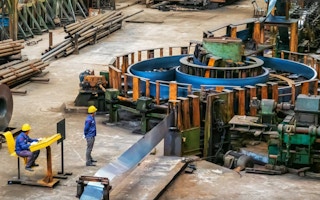Indonesia contributes to 5 per cent of CO2e emissions globally, making the country a critical actor in the global fight against climate change. We joined forces with global actors starting with the 2015 Paris Agreement, recognising that we must curb the global average temperature below 1.5 degrees Celsius from all parts of the economic value chain compared to pre-industrial levels.
One of the most significant parts of the economic value chain is industrial processes, such as steel and cement production, which are energy-intensive. In fact, Indonesia’s emissions from industry (20 per cent) are higher than electricity (14 per cent), according to Breakthrough Energy. When we zoom in on heavy industries, they are responsible for nearly 40 per cent of greenhouse gas emissions.
Industrial processes, mainly in steel, cement, and petrochemicals, require much energy, mainly from heating, producing a huge amount of greenhouse gas emissions. For example, steelmaking uses fossil fuels for burning, such as coal, to convert iron ore into more refined materials.
In addition, the chemical process for producing the commodities also emits greenhouse gas. The cement industry releases carbon dioxide as the natural part of the production process, a byproduct of heating the limestone to produce the cement’s primary component.
As a fast-growing country in terms of GDP, Indonesia’s heavy industrial activities (mainly steel and cement) have proliferated over the past decade. It is poised to become one of the top 3 global heavy industry commodity producers. According to the Indonesian Iron and Steel Industry Association, the country’s steel production capacity is expected to reach 40 million tons annually by 2025, up from 20 million tons in 2019.
The country is already the fourth-largest cement producer in the world, and its production capacity is expected to increase further in the coming years.
“
Decarbonising Indonesia’s steel and cement industry requires a multi-faceted approach involving policymakers, industry players, and other stakeholders.
According to the Global Cement Directory, Indonesia’s cement production capacity was 109 million tons in 2020 and was expected to reach 120 million tons by 2022. Indonesia’s abundant natural resources, such as iron ore and limestone, drive this. Without greening of the heavy industries, this will become a major source of greenhouse gas emissions for Indonesia in the future.
Science points out that the transition towards sustainable practices in heavy industries such as steel and cement production is a challenging task. It is called one of the ‘hard to abate’ sectors for reasons. Its high heat requirement, mainly met through fossil fuel combustion, results in high greenhouse gas emissions.
Moreover, the capital intensity of these industries is significant, with a long asset life, making it challenging to adopt more sustainable technologies and infrastructure, as much money is required—an investment that, without incentive, has unclear monetary benefits.
These are exacerbated because the Indonesian steel and cement industry is primarily dominated by profit-seeking and private companies that operate on low-profit margins due to intense competition in the global market. Any change in demand patterns can significantly impact the profitability of these industries, making it difficult to invest in sustainable practices.
Additionally, these industries face competition from cheaper producers in other countries, leading to a potential loss of market share if they increase their prices to cover the cost of transitioning to greener technologies. The transition to sustainable practices also requires significant investment in research and development, which is hard to finance without government or supporting entities’ incentives.
In light of this, Indonesian companies and the government have begun implementing decarbonisation initiatives in the heavy industry sector, albeit still insufficient. In the cement industry, companies are implementing waste heat recovery systems, which capture the heat generated during production and repurpose it to generate electricity. Some have installed a waste heat recovery system in their plants. In addition, companies are also exploring alternative fuels, such as biomass and municipal waste, as a substitute for fossil fuels.
In the steel industry, companies are implementing energy-efficient technologies, such as electric arc furnaces, which use electricity instead of fossil fuels to produce steel. Companies have installed an electric arc furnace, which has helped reduce its carbon footprint significantly if the source of power is from renewables. Hydrogen as a substitute for coal in the steel production process is also being explored.
From the government side, the Indonesian Ministry of Industry has released Green Industry Standards for the cement industry and several other heavy industry sectors, which set caps on the energy used to produce one ton of product. Future developments of these standards and the implementation of additional mechanisms to accelerate decarbonisation, such as the carbon tax, are anticipated.
However, the above initiatives are still in their early stages, as decarbonising Indonesia’s steel and cement industry requires a concerted effort from policymakers, industry players, and other stakeholders. Here are four recommendations on how to decarbonise the steel and cement industries in Indonesia:
- Establish more concrete policy support and pathways: The government should establish clear policy support and pathways to facilitate the decarbonisation of the steel, cement, and petrochemical industries. This includes setting emissions reduction targets and strategies specific for each sector and company, implementing carbon pricing mechanisms, and providing incentives for adopting green technologies—all are still in the gray area today.
- Leverage international finance institutions: Companies and the government can leverage International Finance Institutions, such as the World Bank, International Finance Corporation (IFC), and Asian Development Bank (ADB), to lower investment risk and subsidise green premiums. These institutions can provide financing for green technology adoption, and their support can help reduce the cost of capital for green projects. In addition, they can provide technical support to lower the risk of adoption of green technologies with capacity building and technology standards.
- Build green steel, cement, and petrochemicals demand: To reduce the “green premium” on low-carbon products, the industry needs to build green product demand by promoting the benefits of using low-carbon steel, cement, and petrochemical products. This can be achieved through the government’s and companies’ public awareness campaigns, green procurement policies, and certification schemes.
- Partner with technology solutions providers: The industry can partner with technology solutions providers, such as renewable energy companies, to ease technology adoption. These providers can help the industry adopt renewable energy solutions, energy-efficient technologies, and waste heat recovery systems, which can significantly reduce the industry’s carbon footprint. In addition, more high technology adoption (such as hydrogen) can also be easier to adopt with cutting-edge partners.
In conclusion, decarbonising Indonesia’s steel and cement industry requires a multi-faceted approach involving policymakers, industry players, and other stakeholders. This is imperative for achieving net zero for Indonesia—and without realising that decarbonising heavy industry is crucial, Indonesia will face difficulties in its journey towards decarbonisation.
Aufar Satria is the Commissioner of the Society of Renewable Energy Indonesia and is a candidate of the University of Cambridge MBA and Harvard University MPA programs. Rauf Usman is the Chairman of the Society of Renewable Energy Indonesia and advisor to companies and governments in the sustainability sector.



















